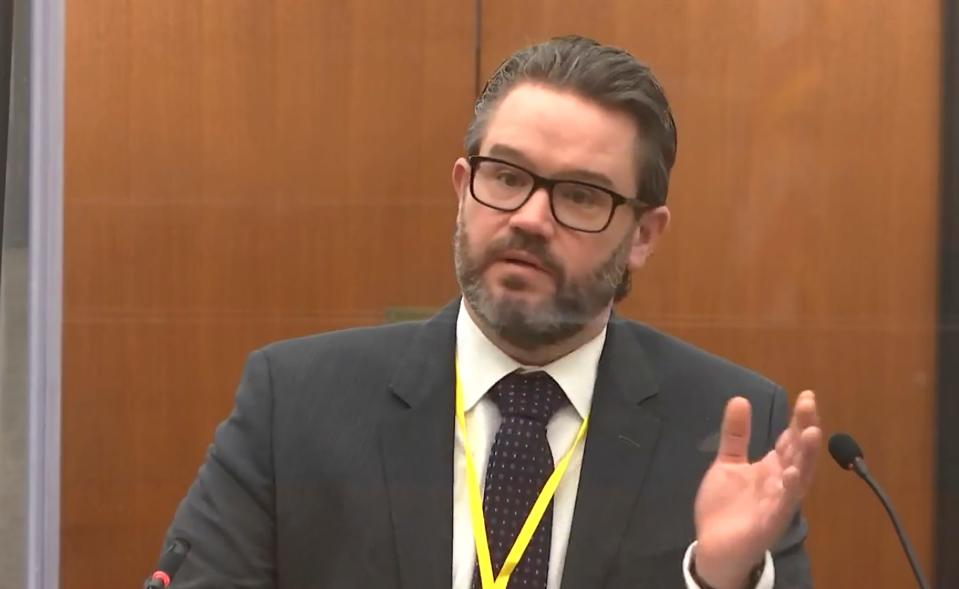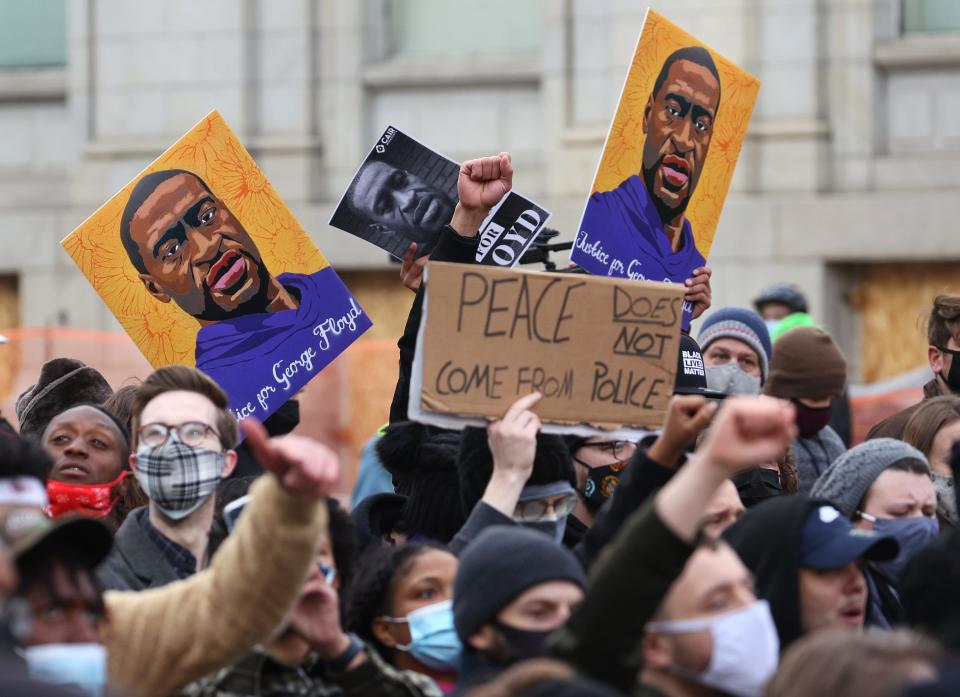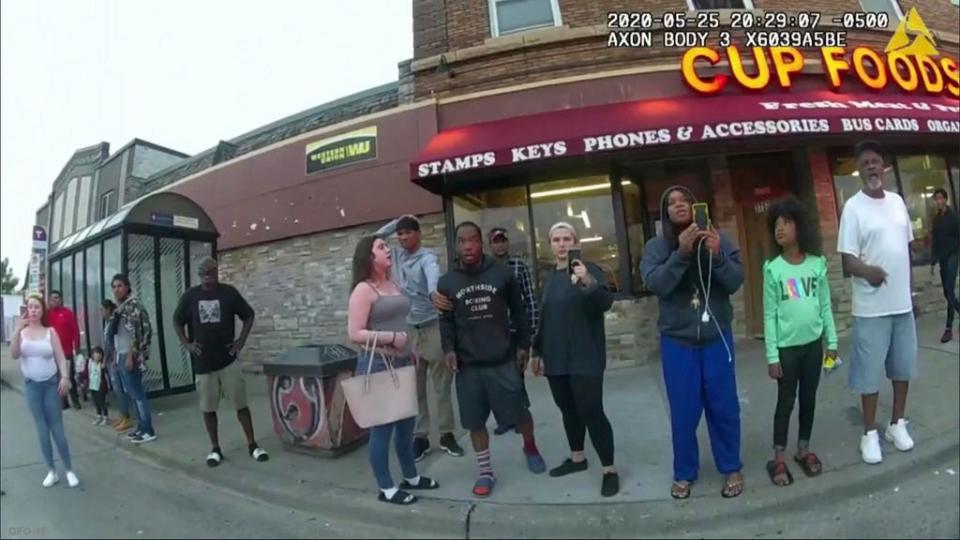Chauvin jury questionnaires provide inside look at challenges of choosing fair panel on high-profile case
- Oops!Something went wrong.Please try again later.
Before Derek Chauvin went on trial for killing George Floyd, legal experts predicted it would be challenging to find an impartial jury.
A USA TODAY analysis of newly released court records shows how it was done.
The 12 jurors selected had seen video of the incident fewer times than the overall jury pool, according to a review of questionnaires filled out by potential jurors. More of the selected jurors had neutral opinions of Chauvin and the other officers charged in Floyd's death. And more said they could be impartial.
Trial experts say that shows the jury selection process worked even though video of Floyd's death was watched widely and sparked worldwide protests over police brutality and racial discrimination.
The goal is "to end up with a higher percentage of neutral people," said Roy Futterman, a New York-based jury consultant and clinical psychologist with DOAR, a litigation consulting company.
Futterman said he wasn't surprised by the results of USA TODAY's analysis.
The differences between those who were selected and those who weren't emerged in pretrial questionnaires designed to probe potential jurors' knowledge of the case, their views of policing, the legal system and racial discrimination, and potential biases.
Kept secret for months by the court, the questionnaires were released last weekalong with the names of those considered and selected to serve. USA TODAY reviewed the questionnaires, focusing on answers to six of the 69 questions.
They asked potential jurors' impressions of the defendants, whether they could be impartial, how many times they saw video of the incident and whether they were favorable or unfavorable toward Black Lives Matter and "blue lives matter," a pro-police slogan.
More: After Minneapolis voters rejected an overhaul of police, how will the city find unity?
The share of seated jurors who wrote that they had a neutral impression of the defendants was greater than the jury pool, and the share of jurors with a negative impression was smaller. About 70% of the pool said they could be fair and impartial; all of the selected jurors said they could.
Seating more impartial people on the jury wasn't enough for Chauvin to overcome the case presented by prosecutors, which relied heavily on videos showing Floyd struggling with officers and losing consciousness as he was pinned under Chauvin's knee in May 2020.
The jury convicted Chauvin on charges of second-degree unintentional murder, third-degree murder and second-degree manslaughter. He was sentenced to 22 1/2 years in prison. The former officer has appealed, based in part on Hennepin County District Judge Peter Cahill's refusal to move the trial due to pretrial publicity.
The jury included six people of color: four Black people and two mixed-race. The remaining six were white.
USA TODAY's findings come as juror impartiality has become an issue in two other high-profile trials now underway. Both have received national media coverage.
In Brunswick, Georgia, three white men are on trial for killing Ahmaud Arbery, a Black man whom, according to defense lawyers, they suspected of burglary. All but one member of the jury is white; other potential Black jurors were excluded by legal challenges that defense lawyers said were made for nonracial reasons.
In Kenosha, Wisconsin, Kyle Rittenhouse is being tried in the August shooting of three white men, two of whom died. The incident occurred during unrest following the shooting of Jacob Blake, who is Black, by a white police officer. Rittenhouse, then 17 and armed with an AR-style rifle, testified that he was there to protect a local business.
The trial's early days featured a video of the shooting, and one juror was dismissed for making a joke about Blake.
We all have a unique perspective: Sign up for This is America, a weekly take on the news from reporters from a range of backgroundsRittenhouse trial: Kyle Rittenhouse breaks down on the stand at his murder trial, tells jury he 'didn't do anything wrong'
Jurors' questionnaires used to suss out bias
Criminal courts often use questionnaires to tease out potential jurors' opinions in highly charged cases. Defense attorneys and prosecutors use their answers as a guide during jury selection.
Cahill kept the Chauvin trial questionnaires under wraps, along with the identities of the 12 jurors and the rest of the jury pool, due to concerns about their safety. They were released after a coalition of news organizations, including USA TODAY, asked him to make them public, citing the presumption of open access to court records.

USA TODAY repeatedly sought comment from the jurors, but they didn't respond.
Seven jurors recounted their deliberations in an interview with CNN days before their names were made public. They said they decided the case solely on the evidence, particularly the video of Floyd's death that has been seared into the nation's consciousness.
Juror profiles: Jurors have been selected in trial over Ahmaud Arbery's killing. Here's what we know about them.
Unnamed juries: Minnesota judges hide jurors' names when police go on trial in killings
The first two people questioned for the jury
The differences between the jurors and the overall jury pool jumped out in the questionnaires of the first two people questioned in court.
The first one, Gloria Mendoza, 47, a part-time nursing assistant, wrote that she had a very negative view of Chauvin and the other officers because "they acted with hatred."
She wrote that she'd seen video of Floyd's death two to three times, and she wanted to serve as a juror "to give my opinion of the unjust death of George Floyd."
After questioning, defense attorney Eric Nelson used a legal challenge to dismiss her.

Next up was Joseph Tillman, a laboratory analyst. He wrote that he had a somewhat negative impression of the defendants. "I don't view people who kill others – intentionally or unintentionally – in a positive light, but also am cautious to draw conclusions prior to a trial," he wrote.
Tillman wrote that he wanted to serve on the case. "I also think I would be a good and fair juror."
He was the first one selected.
The search for impartial jurors in a widely publicized case
Other potential jurors struggled with a question on the form asking if they could be fair and impartial despite what they had seen or heard about the case. Legal experts expected that would be a key issue in selecting the jury.
Minneapolis architect Travis Beck, 50, wrote that he had a somewhat negative impression of Chauvin and the other officers, who are scheduled to stand trial next year. "As a police officer you are to protect and serve. This action was neither," he wrote.
Yet he wrote "yes" to a question about whether he could be fair and impartial.
Beck was dismissed for cause by Cahill after in-court questioning.
"I could not start off with a baseline of thinking of Mr. Chauvin as innocent," he told USA TODAY in a phone interview. "There’s some culpability there. That was my issue.”
Sarah Davis, executive director of the Legal Rights Center in Minneapolis, said most people have a perception of their ability to be neutral "that is maybe not in line with reality." The jury selection process is aimed at bringing clarity.
"People bring their whole selves to the jury box," Davis said, "and the question is, can you get them to reveal their whole selves so that you can make good decisions about who would be able to fairly serve on a jury?"
Negative impressions of officers widespread among jury pool
The second question on the form was, "From what you have seen, read or heard, do you have a general impression of the defendants? ... Why do you feel that way?"
In all, 80 out of 109 potential jurors, or 73%, wrote that they had a very or somewhat negative impression of the officers. Two others had a negative impression of Chauvin but were neutral about the others.
Eight of the 12 jurors, or 67%, had a negative impression of the defendants.
Another 21 potential jurors, or 19%, had a neutral impression of the defendants, plus another who checked both negative and neutral. On the jury, it was four, or 33%.

Only three prospective jurors had a very or somewhat positive view; none was chosen. None of the jurors who decided the case wrote that they had a positive impression of the defendants.
Explaining his impartial stance toward the officers, Tossa Edorh, 50, a technician for a medical device manufacturer, wrote, "because so far I have not hear(d) anything or (a) statement from them."
Edorh wrote that he had not spoken to others about his views because "I don't like expressing my opinions to people."
He was the eighth person selected as a juror.
"You're doing better from a defense standpoint to get more neutrals" among the jurors, said Alan Tuerkheimer, a lawyer and psychologist who is the founder of the Chicago-based consulting firm Trial Methods. "I could see where they might have thought they had a shot" of winning an acquittal.

Jurors watched video of Floyd's death fewer times
People who were selected for the jury came into the trial having seen video of Floyd's death far less than the overall jury pool: 25% of jurors had seen seen video at least four times compared to 44% of the jury pool, according to USA TODAY's review.
Twenty percent of the juror pool wrote that they had seen video once, compared to 41% of the jurors who were selected.
Kathryn Noack, a registered nurse who filled out the jury questionnaire, was one of those who had seen the video once. She summarized her reaction to the video by writing a single word: "traumatic."
"I couldn't watch the whole thing, to be honest. … I mean, I was sick," Noack, 32, said in a phone interview. "It just hits you in the gut. This is actual real life.”

She wrote on her questionnaire that she had a negative impression of the defendants. Noack was dismissed without undergoing questioning in person.
Abel Sessofia, 38, who is West African-born and works in information technology, was selected for the jury.
He wrote that he saw video of Floyd’s death just once, on TV. Although it influenced his negative view of the defendants, he wrote, "I also understand that I wasn't there and I don't know what happened before the event."
He wrote that he had discussed with others “how it could have been me, or anyone else.”
Tillman was the only one selected for the jury who wrote that he hadn't seen video of Floyd's death before the trial.
Selecting jurors who had less exposure to the video may have boosted the defense, but only to a degree, said Cynthia Cohen, founder of Los Angeles-based Verdict Success.
"You can't erase that they had seen the video, even if they had only seen it once," Cohen said. "Video is just very compelling. You're not there, but you're next to being there."
Jurors ended up watching the bystander video and several others many times during the trial.
Chauvin's appeal of his conviction includes arguments that Cahill erred by denying defense motions to move the trial out of Hennepin County in response to pretrial publicity, and by not sequestering the jurors during trial. Cahill noted in his denial that the video was not shared solely in the Twin Cities area, but was aired across national media and went viral online.
Cohen said she doesn't think Cahill could have mitigated potential jurors' negative impressions of Chauvin and the broad exposure to the video by moving the trial.
"The case was so widely known that it may have made no difference at all if it had been moved to a neighboring venue," Cohen said. "People don't live under a rock."
Nora Hertel of the St. Cloud Times contributed to this story.
This article originally appeared on USA TODAY: Derek Chauvin trial jury: Why it was so hard to find impartial jurors

